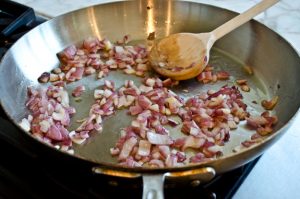Do you find chopping onions, a herculean task too?
For me, chopping those scaly things has always been a formidable task. Excuses come naturally to me, whenever Mom asks me to chop some onions. But all my efforts to make the great escape goes in vain; Mom’s orders, you know how they go! The encounter with those little monsters always leaves me looking disastrous with my eyes turning red and tears streaming down from them and Ugh! the irritation and the burning sensation that goes along with it, is simply too much to bear.

We have always wondered what gives these scaly vegetables, the power to make us cry. Is it that you feel the pain while cutting them or when they get hurt … No! Just Kidding. Not all of us are so empathetic. Then, what could be the reason behind the activation of the tear glands? Let’s explore and plunge deep into the world of onions.
The superpower
Onions, scientifically known as Allium cepa, are a part of the plant genus Allium, along with garlic and other 400 others plants. The plants of this genus absorb Sulphur from the earth. The absorbed Sulphur is used to form a class of volatile organic molecules called amino acid sulfoxides. These sulfoxides are the real tear-jerkers when onions go under the knife.
The mechanism
Onions contain compounds like amino acid sulfoxides. As the knife slices through the poor onion, it tears through its cells, releasing its contents like the powerful sulphur compounds. Certain enzymes present in the cell are also released.
Scientists were of the view earlier that the enzyme ‘allinase’ is responsible for the reactions. Recent studies from Japan, however, proved that lachrymatory-factor synthase, is the culprit. These enzymes react and produce sulfenic acid. The sulfenic acid being unstable, forms a chemical irritant propanethiol S-oxide (combination of Sulphuric acid, Sulphur-dioxide and hydrogen sulfide), which is a volatile sulphur compound.

The gaseous compound starts wafting towards the eyes. The volatile gas reacts with the water of the eye and forms sulphuric acid (mild). The acid is responsible for the irritation and the burning sensation. When this happens, the brain immediately activates the lachrymal glands. The tear ducts work overtime in order to get rid of and flush out the irritant from the eyes.
Since the tears have nothing to do with emotions, they can be of two types. Basal tears or Reflex tears:
-
Basal tears are those which are always present in the eyes. Their function is to lubricate.

- Reflex tears are those which are produced when our eyes encounter some foreign object like dust, pollen or any irritant.
So, this is clearly a case of reflex tears. The propanethiol-S-oxide in the air around our faces enters ours eyes and elicits the reflexive tear response. Multiple nerve endings warn the brain that the substance could harm our eyes. Consequently, the brain activates the lachrymal glands, and we end up sniveling.
The process goes as follows:
- Cutting the onion release the Lachrymatory-factor synthase into the air.
- The amino acids sulfoxides and converted into sulfenic acid by the action of the enzyme.
- The sulfenic acid is unstable and it rearranges itself into propanethiol S-oxide.
- The propanethiol S-oxide gets into the air and comes in contact with our eyes.
- The volatile compound reacts with water in the eyes and forms sulphuric acid.
- The brain signals the lachrymal glands to activate and produce the tears!
The same sulphur compound is responsible for the persistent typical odour on our hands and the utensils that were in contact with onions.
 Why don’t cooked onions make you cry?
Why don’t cooked onions make you cry?
When the onions are cooked, the heat inactivates the enzyme. Thus, no sulphuric acid is formed. The smell of onions may be strong even after cooking owing to the sulphur content but, it doesn't burn the eyes.
Things to avoid
-
 Normally, one thinks of closing the eyes when the burning sensation starts off. But closing your eyes while chopping may lead to another disaster like you may chop your finger or get hurt. Certainly, not a good idea, is it?
Normally, one thinks of closing the eyes when the burning sensation starts off. But closing your eyes while chopping may lead to another disaster like you may chop your finger or get hurt. Certainly, not a good idea, is it?
- Rubbing your eyes is a big No! No! As it will only aggravate the tears since your hands are full of the onion juice.
- Avoid cutting the onion till the root, this will prevent the mixing of enzymes with the sulfenic acids and you can spare your eyes off the burning sensation.
Remedies.
-
 Try wearing safety goggles so that the gas cannot come in contact with your eyes.
Try wearing safety goggles so that the gas cannot come in contact with your eyes.
- If you aren’t sporty enough to wear those goggles in the kitchen, try to move your face a little away from the onions. This way the gas disperses before it can reach your eyes.
- You can refrigerate the onion or put them in cold water before cutting. Cooling inactivates the enzymes and prevents the formations of sulfenic acids. As a result, no sulphuric acid formed and your eyes are saved.
- Cutting the onions under flowing water dissolves the gases and saves your eyes.
To avoid the smell
To ward off the signature smell of onions, you can rub lemon on your hands. The strong smell of the lemons masks the pungent Sulphur smell of the onions.
Well, until low Sulphur containing or genetically modified onions which produce very little or no eye irritant become ubiquitous, we hope that with these simple tricks, all of you have tear-free onion chopping experiences in the future.
